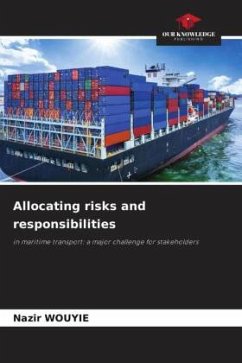
Maritime and Transport Insurance facing the Risks of the XXI° century:
New risks or forgotten risks?
Versandkostenfrei!
Versandfertig in 6-10 Tagen
65,99 €
inkl. MwSt.

PAYBACK Punkte
33 °P sammeln!
The 21st century is characterized by an acceleration of travel and a strong global integration pushing the actors of international trade to reorganize the logistic chain, to imagine new means of routing, packaging and conditioning. This globalization has favored the emergence of new or simply forgotten risks compared to those of the 20th century. Loss of containers, accumulation of values in the same place or on a ship, cyber threats that can seriously affect navigation systems, use of new polar routes, parametric rolling, the upcoming arrival of unmanned ships... Questioning the principle of ...
The 21st century is characterized by an acceleration of travel and a strong global integration pushing the actors of international trade to reorganize the logistic chain, to imagine new means of routing, packaging and conditioning. This globalization has favored the emergence of new or simply forgotten risks compared to those of the 20th century. Loss of containers, accumulation of values in the same place or on a ship, cyber threats that can seriously affect navigation systems, use of new polar routes, parametric rolling, the upcoming arrival of unmanned ships... Questioning the principle of assistance to persons at sea itself... Are we witnessing upheavals? New risks or forgotten risks? An examination of all the risks will enable us to answer this question and to appreciate how the Marine and Transport insurance markets have adapted to these risks, sometimes moving closer to other insurance lines to find the best response to the risks presented.












